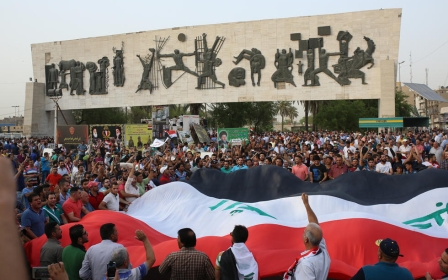Thousands turn out for fresh anti-corruption protests in Baghdad

Thousands of Iraqis once again took to the streets Baghdad's Tahrir Square on Friday to protest rampant corruption in the country. The crowds included supporters of the powerful Shia cleric and political leader Muqtada al-Sadr for the first time since the protests began earlier this summer.
Protesters have taken to the streets of Baghdad and cities in the Shia south for weeks, railing against rampant corruption and abysmal services, especially power outages that leave just a few hours of government-supplied electricity per day during the scorching summer heat.
Prime Minister Haider al-Abadi has responded to the demonstrations and a call from Iraq's top Shia cleric, Grand Ayatollah Ali al-Sistani, with a reform programme aimed at curbing corruption and streamlining the government, but it is still in its early stages.
At Friday's demonstration, hundreds waved Iraqi flags and chanted anti-corruption slogans in previous weeks, but this time the crowd also included supporters of Sadr, responding to his call to take part.
Sadrists, many of them dressed in black, chanted slogans including "Bye bye Nouri al-Maliki" and called for the ex-prime minister, whose eight years in office were marked by widespread corruption, to be executed.
"We came out [to protest] in support of the reforms that were announced by Prime Minister Abadi. We want to push and support the state in implementing them," said Nafia al-Bakhaki, an official in the Sadr movement.
"All the officials in the previous governments, especially Maliki's government, are responsible for corruption," said Sheikh Samir al-Zraijawi, also from the Sadr movement.
However, not all welcome the involvement of Sadr and his supporters. Sadr's party had ministers in Maliki's governments and it still wields significant influence despite the 43-year-old cleric seeking to officially distance himself from politics as he pursues religious studies.
"It is hypocritical and misleading [to say the Sadrists] are with the people," said Iraqi Communist party member Siham al-Zubaidi, noting their strong presence in parliament and the fact that a since-resigned Sadrist deputy premier faces corruption allegations.
Parliament signed off on Abadi's proposed reforms as well as additional measures, and the prime minister has begun ordered changes, including the scrapping of 11 cabinet posts and for the bloated number of guards for officials to be slashed.
But even with popular support and backing from Sistani, the fact that parties across the political spectrum benefit from corruption is seen as a major obstacle to the nascent reform effort.
Stay informed with MEE's newsletters
Sign up to get the latest alerts, insights and analysis, starting with Turkey Unpacked
Middle East Eye delivers independent and unrivalled coverage and analysis of the Middle East, North Africa and beyond. To learn more about republishing this content and the associated fees, please fill out this form. More about MEE can be found here.




